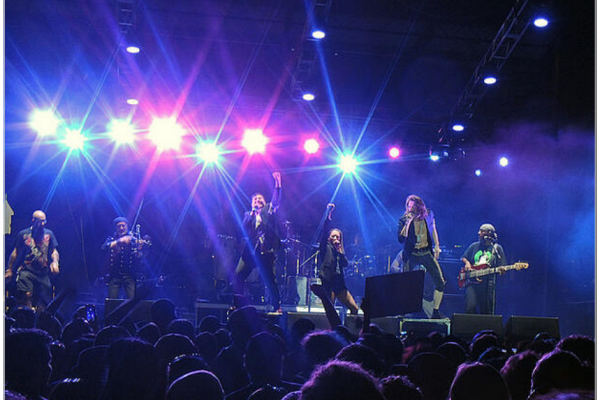20 secrets promoters use to book bands

When it comes to getting booked, it’s no secret there are a couple of key ingredients that go into a venue’s decision to say “yes.” But for many, what those secrets are, remain largely a mystery.
And the truth is everyone will have a slightly different process, preference, and method for booking bands, but if you’re an artist who is currently struggling to figure out exactly how to grab the attention of that venue and book yourself, then you’re going to want to pay attention.
1. They evaluate bands by their EPKs
You can’t get away from this one. Knowing how to put together a solid EPK is going to be #1 on your ways to get in front of a venue and stand out.
Of course, at Artist.vn our EPK creator is designed with promoters and venues so that you know you’re including all the information they want — things like live video, links to your social media and music, and a list of past show dates are all absolutely crucial to an EPK.
2. They appreciate bands sharing their highlights
Most musicians are not good at talking themselves up. It’s just the reality. Still, when you’re trying to stand out against the rest, there should be a certain amount of confidence that goes into the email you send or the call you make. (Note: Calls might work for some venues but most prefer email since it allows you to send all your links.)
You don’t want to be obnoxious in talking yourself up, but you do want to try to highlight some of your selling points. For example, if you’ve played major festivals or venues in the area, if you frequently draw 200 people to a show, if you’ve consistently been asked back to the same venues, those are all bullet points you want to include.
3. They appreciate bands that stay organized
If you want to book more gigs, you'll need to get a whole lot more organized. This means putting together and keeping updated spreadsheets of venues and including things like their name, contact, email, phone number, venue cap and address, genres they cater to, audience demographics, etc. A good place to start? Artist.vn own venue database.
If you've played before, you'll also want to include the dates and rough audience turnout. Besides this just being a good housekeeping effort, this means you can easily reference which venues might be a fit for which shows and pull data (like your last audience size) to send promoters without much effort.
4. They think outside the box
When you’re first starting out, it might be tempting to stick to well-known venues and tried and true spaces to get your initial experience and rely on a decent draw from people who regularly frequent the venue.
But a good promoter isn’t afraid to think outside the box when it comes to shows. They might pair together unique acts, or host the show somewhere untraditional like an art gallery or bowling alley, or make it a special theme (emo night anyone?)
Don’t be afraid to have fun with this and get a little creative. The more it speaks to your band’s personality and audience, the better.
5. They build their relationships
It’s no secret most everything in this industry comes back to the company you keep. A huge reason artists hire team members is simple — they don’t have the connections and they don’t have the time or energy to make them. But trust me when I say no matter what, you want to focus on building your relationships. This goes for in and outside of the booking sphere. Trust me — this will be the most important thing you do.
6. They embrace collaboration
This one ties back into the relationship building. A good promoter knows the power of collaborations, and the doors they open. Don't be afraid to partner up with other bands, venues (traditional or non-traditional like we talked about above) to create your own opportunities.
7. They appreciate thoughtful negotiation
This is a pretty standard part of any booking process, but if you want to negotiate with promoters and get yourself more gigs (and compensated more fairly) you need to go into negotiations with a clear idea of what you’re after (and what’s realistic) but be willing to budge when necessary.
For instance, maybe they’re paying you a little less but it’s a better night or higher profile headliner. You have to weigh if that’s worth it for you. Sometimes, it will be.
8. They look for bands that create buzz
Part of the process is letting people know the show is actually happening, and especially when it's a big show (i.e., album release, big venue, etc.) you want to bring as much attention to it as possible. The more attention, the more buzz you'll create, the more people will come out, and that, of course, will always help you book more shows.
9. They check your social media engagement
If you’ve heard it once you’ve heard it a million times. Having an active and engaged following will help you in everything from booking gigs to getting press, so get on it!
10. They book strategically
You have to strike the balance between playing out enough that people remember you and not so much that no one wants to come out. There’s no hard and fast number for this, but aiming for roughly one show a month per location (i.e., if you’re in Boston, play once a month in the city, maybe once a month in New Hampshire, and so on). If you notice no one is coming out still, and you’re doing everything else right, try spreading it out a bit more.
11. They know how to stack a lineup
I love seeing a ton of new bands on a lineup, but the truth is, if all your shows are with other bands who also only have 500 followers, you’re not going to grow as fast as you want. Make sure you’re approaching promoters with the goal of mixing it up with some bigger headliners — even if they’re not a lot more established than you, even just having a different enough and slightly bigger following/traction will help you get in front of new fans
12. They look for bands that play on diverse lineups
You might love playing with two or three specific local bands, but if you want to impress promoters, you need to mix it up and that includes who you share the stage with
13. They look for bands with unique ideas
Don’t be afraid to get creative with your shows — in fact, I’d encourage it! Take advantage of seasons like, having a Halloween show, a Christmas show, etc. The more of an experience you can give your fans and the more unique, memorable things you can do, the longer (and fonder) they’ll remember you, and the more often they’ll turn out.
14. They look for bands that promote themselves
Flyers, graphics for social media, Facebook events, you name it, if it can get people out to a show, promoters use it to get their bands seen, and if you want to replicate that, you’d better be doing the same
15. They evaluate bands based on their pitch
There’s an art to pitching yourself, and learning what to say and what to leave out can mean the difference between getting booked and getting ignored. Check out some of these tips in more detail here.
16. They like bands who know their audience
This goes hand in hand with knowing how to pick a venue, city, date, time, etc — if you are crystal clear on who your fans are, inside and out, you can choose venues, cities, and times that will suit them and help ensure they come out. This will also help prove to promoters that you will, in fact, draw an audience.
17. They like killer setlists
Don’t wing it — know what gets the best audience reaction and make those songs an integral part of your setlist. Patrons having a good time means more people coming out, which means...getting booked more often.
18. They like bands who make it simple for them
The less you need in terms of set up and equipment, the more options you’ll give yourself when it comes to booking gigs. The simpler the set up, the more gigs you’ll get.
19. They like bands with a strategy
Promoters always have a strategy when they book bands. They know why they chose a specific venue or weekend or part of town, and you should to. Knowing why you’re doing what you’re doing is crucial to longterm success.
20. They appreciate when bands always create a memorable performance
The best thing you can do for yourself is to make every single show incredibly memorable. That means bringing all your energy to the stage every time, interacting with fans, making them feel included, and giving it your all every single time.
We’re just getting started — if you’re looking for more tips and examples on increasing fan engagement through simple, effective social media strategies then join me for my free Masterclass ‘How to gain your next 1,000 fans. 3 simple steps that lead to higher engagement, sold-out shows, and life-changing opportunities.’
Angela Mastrogiacomo is the founder and CEO of Muddy Paw PR, where her artists have seen placements on Alternative Press, Noisey, Substream, Spotify and more, as well as the Director of Community and Events for Music Launch Co. She loves baked goods, a good book, and hanging with her dog Sawyer.
Reference: https://blog.sonicbids.com/20-secrets-promoters-use-to-book-bands
Posted 4 years ago

Add a comment